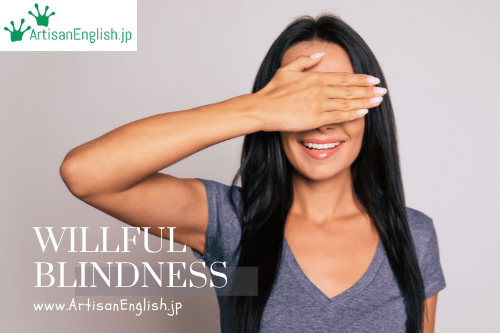
YouTube / iTunes / Spotify / Radio Public / Pocket Casts / Google Podcasts / Breaker / Overcast
Listen to ArtisanEnglish.jp posts & lesson intros here.
WotD: Willful blindness
Humans want to know everything.
The desire for knowledge is behind the human passion for climbing mountains, crossing oceans and space exploration.
However, there are times when knowledge is not as beneficial as not knowing.
It’s moments like those when we choose willful blindness.
We call a lack of knowledge willful blindness when we make a conscious decision not to know something.
The problem is that when we make an effort not to know something, we must already know it or at least know something about it.
Once you know something, it’s almost impossible to unknow it.
I’m sure your friend or someone else you know wanted to tell you something, but you said, “Don’t say it! I don’t want to know!”
That, my knowledge-hungry reader, is willful blindness.
If your friend suddenly comes into a lot of money and you think they obtained it illegally, you can protect yourself through willful blindness.
By intentionally not knowing how they got it, you are protecting yourself from being implicated or liable for whatever illegal thing you think they committed to obtaining that money.
In TV dramas, it’s common for mafia or crime boss lawyers to leave the room when illegal acts are discussed.
They are choosing willful blindness to protect themselves.
Later on, after they are arrested, whatever their clients tell them is protected by the attorney-client privilege.
Firsthand knowledge will get lawyers into trouble, whereas attorney-client privilege is their business.
Remember what I said about willful blindness, meaning you must have known something about the information?
If you don’t want to know, you must know there is something you shouldn’t know.
Sometimes choosing to be willfully blind is just as bad as having full knowledge or perhaps worse.
Flesch-Kincaid Readability Test
This post is understandable by someone with at least an 8th-grade education (age 13 – 14).
On the Flesch-Kincaid reading-ease test, this post scores 68.
The easier a passage is to read, the higher the score on a scale of 0 – 100.

